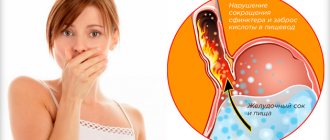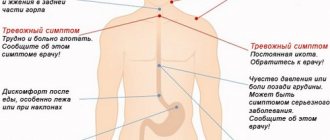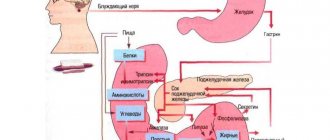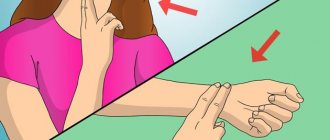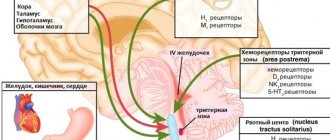Causes of bile belching
The root cause of bitter belching is the reverse release (reflux) of bile through the sphincter that separates the stomach and duodenal process. Valve failure can be caused by the following factors:
- Eating disorders and abuse of junk food. In this case, belching is accompanied by nausea. The problem may arise after hot food is washed down with cold water.
- Pregnancy. Due to the constant growth of the uterus and fetus, there is strong compression of organs, in particular the duodenum and liver, an increase in the concentration of the hormone progesterone, which relaxes muscle tissue in a woman’s body in preparation for labor, a constant release of bile and the appearance of bitter belching. Frequent overeating or abuse of junk food can provoke symptoms in a pregnant woman, and then nausea may also appear. There is no need to treat the condition, but it is worth reducing the number of refluxes due to the risk of developing complications in the form of gastritis, duodenitis, and ulcers.
- Tumors, hernias, blunt injuries of internal organs. The main causes of bitterness in the mouth and throat: compression of the duodenum;
- rupture of the bile ducts or bladder.
- Long-term treatment with certain medications. We are talking about muscle relaxants, antispasmodics, which have a detrimental effect on the liver.
- Chronic duodenitis. The disease provokes swelling and inflammation of the duodenal mucosa. As a result of dysfunction, there is a violation of motility and relaxation of the locking valve, which is not able to retain bile in the intestine and its active reflux into the stomach occurs.
- Operations when: complications arose during the intervention;
- the sphincter muscles of the pylorus were dissected.
- Diseases of the gallbladder, inflammation of the bladder, cholelithiasis. In this case, belching with a bitter aftertaste appears more often at night during sleep due to maximum relaxation of the sphincter muscles and weakening of the natural defense against bile. The condition is often accompanied by a burning sensation.
- Liver problems: hepatitis, cirrhosis, failure. A burning sensation often accompanies belching and hepatic colic in the area where the organ is projected.
If regurgitation with bitterness and bile occurs, you should consult a gastroenterologist or therapist. Doctors carry out diagnostic tests to establish the exact causes and diagnosis. After this, a treatment regimen is determined.
During diagnosis the following methods are used:
- A general examination, collection of complaints, palpation and other primary diagnostic methods are carried out to create an overall picture.
- Blood, stool, and urine tests are taken.
- An ultrasound scan of the gastrointestinal tract is performed.
- Colonoscopy.
- Probing.
- Determination of bacteria in the body.
After making a diagnosis, a specialist can tell you what to do when belching bile, what medications, nutritional rules and other measures to use.
Symptoms
At the beginning of the development of diseases and other disorders, the mouth does not taste bitter or the symptom appears very rarely. With the development of pathology, the taste becomes pronounced and frequent; after a meal, bitterness appears more often and then people begin to think about the causes and problems, and also look for solutions. Without treatment, bile emissions become voluminous, causing severe damage to the body and gastrointestinal tract.
Without timely treatment, changes occur in the mucous membrane and esophagus as a result of irritation. In this case, belching with bile is accompanied by other symptoms, including:
- Constant thirst. It will be regardless of food, eating spicy or salty. Even after drinking water, a person does not stop wanting to drink.
- Heartburn. The symptom is dangerous, especially with the addition of bitter belching.
- General discomfort. Patients develop pain syndromes, most often localized in the stomach, under the ribs on the right.
- Nausea and vomiting. With this symptom, there will be a clear bitterness in the oral cavity. Nausea disappears after a while, and after profuse vomiting and cleansing of the stomach, complete relief occurs.
If bitterness in the mouth is accompanied by 1-2 more symptoms, then you need to seek medical help. This condition indicates illness and requires urgent help.
Folk recipes
You can get rid of unpleasant symptoms using folk remedies. It should be borne in mind that the disappearance of bitter belching is not a sign of complete recovery. If the situation repeats frequently, you should consider visiting a specialist. Traditional methods are used as an independent remedy or as an auxiliary remedy as part of complex therapy to accelerate the desired effect.
First of all, it is necessary to exclude from the diet foods that irritate the mucous membrane of the digestive organs, complicating their work. Coffee, chocolate, strong tea, carbonated drinks, sweets, spicy, salty, fatty, fried foods are prohibited. And also canned food, brown bread, radishes, legumes, cabbage, tomatoes, citrus fruits, sour fruits.
- Mint, raspberry leaf, cloves, and cinnamon quickly relieve unpleasant bitterness in the mouth.
- If bitter belching is associated with stagnation of bile, flaxseed oil will help cleanse the organs. It should be consumed three times a day, 1 tbsp. spoon 20 minutes before meals.
- A decoction of barberry roots quickly eliminates unpleasant symptoms and can be used by pregnant women. Pour boiled water over the raw materials in a ratio of 1:10. They insist for half an hour. Drink in small sips as needed when an attack of heartburn or belching occurs.
- If bitterness or belching is constantly present, you can get rid of it with the help of aloe and viburnum juice. Mix the ingredients, add honey. Store in the refrigerator, take 1 tbsp. spoon in the morning on an empty stomach.
- Apple cider vinegar reduces acidity, relieves heartburn and belching. Add 2 teaspoons of the product to 1 liter of water and drink 50 ml.
- Ashes from birch buds take 0.5 teaspoons.
- A decoction of mint, lemon balm, chamomile, thyme, rose hips, linden. Eliminates inflammatory processes, relieves pain, disinfects, envelops, reduces acidity, and has choleretic properties. You are allowed to take 3 cups per day. Pour the mixture with water, boil for 5 minutes over low heat, and leave for the same amount of time. Add sugar or honey to taste.
- Mix the juice of parsley, celery, and carrots. The ratio does not play a special role, but you always get more carrots than others. Drink during bouts of belching or when there is bitterness in the mouth.
Folk remedies help to get rid of bitter belching temporarily, but do not act on the root cause. To finally get rid of unpleasant symptoms, it is necessary to undergo full treatment.
Therapy with folk remedies is an effective supportive measure. To provide a choleretic effect that helps eliminate bitter belching, the following recipes are used:
- A mixture of milk (liquid cream) and tomato juice, taken in a 50/50 ratio. You need to drink the drink every time you eat. The product helps restore the acid-base balance, remove bile from the stomach, and eliminate burning sensation.
- Eat 100 g of powdered flax seeds, diluted in 300 ml of water. The mixture is suitable as a breakfast food. Medicinal porridge helps remove bile, strengthen the walls of the stomach, and eliminate heaviness in the stomach.
- Infusion of dandelion rhizome. The product is prepared as follows: 1 tbsp. l. plants in 250 ml of boiling water. You need to take the medicine after infusing it for 2 hours, 4 times a day. before meals. The drink eliminates the symptoms of reflux.
Bitter belching: therapeutic therapy, effective folk remedies and methods of disease prevention
Therapeutic therapy for the release of putrefactive air from the stomach is selected for each patient individually, depending on the specific cause of the pathology, the degree of its neglect and the presence of additional diseases in the patient.
A prerequisite for successful treatment in this condition is adherence to dietary nutrition. Thus, a person should stop drinking alcohol, spicy, fatty and salty foods. It is also important not to eat foods that are difficult to digest. The basis of the diet should be light dishes of fish, vegetables, meat, and cereals.
If bitter belching was caused by inflammation of the gallbladder, the patient is prescribed analgesics, choleretic drugs and, if necessary, antibiotics.
If stones are detected, surgeons usually recommend surgery.
Detection of viral hepatitis of the liver requires long-term hospital treatment with antiviral drugs and immunomodulators.
When diagnosing liver cirrhosis, diuretics and beta-blockers are used. Unfortunately, it is impossible to completely cure cirrhosis, however, with regular therapy, the patient’s condition can be maintained in stability. The drug Rovachol may also be prescribed.
To protect the esophageal mucosa from the reflux of acids, the patient is prescribed painkillers that reduce acidity (Rennie, Almagel).
To strengthen the sphincter muscles, Omez is usually used.
As for the treatment of pregnant women, drugs for them should be selected with extreme caution. If belching frequently bothers you, then women in this position need to sleep sitting up, and also be sure to follow a diet.
Folk remedies
Today, many effective folk remedies are used to treat bitter belching.
The best recipes for this are:
- Take 2 tablespoons of flax seeds and pour boiling water over them. Infuse, strain and take the product throughout the day before meals. It will envelop the mucous membrane, which will help with chronic gastritis.
- Take a spoonful of flaxseed oil before meals.
- Take mint, cloves, and cinnamon in equal quantities. Pour a spoonful of the mixture into a glass of boiling water. Infuse and take a spoon before meals.
- Mix aloe juice with honey. Take a spoonful on an empty stomach.
- Take 1 liter of water and add 2 tsp to it. apple cider vinegar. Drink 50 ml per day.
- Mix lemon balm, thyme and chamomile. Pour 400 ml of boiling water over a spoonful of the mixture. Infuse and take a glass a day.
Before using traditional treatment, it is important to consult a doctor, especially if a person already suffers from chronic diseases of the digestive system.
It is important to understand that folk recipes, despite their effectiveness, will only help alleviate unpleasant symptoms. They will not get rid of the root cause of the disease. Moreover, if during such therapy a person’s condition worsens, he should abandon traditional recipes and immediately consult a doctor.
Consequences
Frequent regurgitation of bile and burning is not only a symptom of a specific disease, but can also provoke serious complications due to the lack of adequate medical assistance, such as:
- Barrett's syndrome is a precancerous condition involving the onset of metaplasia, that is, uncontrolled cell division.
- GERD is a reflux disease in which inflammation of the esophagus occurs, provoked by the regular reflux of bile-containing medium. If treatment is not timely, surgical intervention is required due to severe damage to the esophagus.
- Reflux gastritis is a severe inflammation of the gastric mucosa due to repeated cycles of exposure of bile acids to its walls. The process can be aggravated by surges in the acidity of digestive juices in the stomach.
Prevention
Effective preventive measures to prevent the occurrence of bitter belching in the throat and prevent the development of complications are:
- refusal of soda, coffee, legumes, alcohol;
- avoiding smoking;
- timely diagnosis and elimination of gastrointestinal diseases such as gastritis, cholecystitis, gastric and duodenal ulcers.
Prevention methods are aimed at maintaining the functioning of the liver, gall bladder, and the entire gastrointestinal tract. To prevent unpleasant symptoms, it is recommended:
- do not abuse alcohol;
- quit smoking;
- do not use drugs;
- prevent uncontrolled use of medications;
- stop taking birth control pills;
- Healthy food;
- monitor your diet;
- spend more time outdoors;
- play sports, take long walks;
- treat diseases in a timely manner and prevent chronic progression;
- strengthen the immune system.
The basic rule for preventing bitter belching for healthy people is to dose out alcohol, coffee, fatty, spicy foods, chocolate, monitor your diet, and avoid overeating. Do not get carried away with carbonated drinks, spices, mayonnaise, ketchup, sauces, chips, nuts with flavor enhancers.
To prevent the occurrence of pathological belching, you should undergo regular medical examinations. It is also recommended to limit the consumption of fried, fatty, spicy foods, legumes and foods high in yeast, fast food, confectionery, alcoholic and carbonated drinks. You should eat in small portions, avoiding overeating. It is not recommended to take a horizontal position immediately after eating.
Video
Belching that appears after eating is a natural process of digestion. The presence of air in the stomach helps to increase the motor activity of the organ and improve the process. Belching bile with bitterness signals the development of pathologies in the digestive tract. In particular, the functioning of the liver and gallbladder is affected. This may be a temporary dysfunction, or it may be a serious problem.
The occurrence of belching is provoked by a spasm of the lower muscle connecting the stomach and esophagus. The appearance of an unpleasant bitter taste in the mouth is the result of the penetration of bile first into the duodenum and then into the stomach.
Diagnostics
To fully examine a patient complaining of bitter belching, several approaches are used:
- General examination, evaluation of complaints and medical history.
- Laboratory tests: clinical tests and blood biochemistry;
- checking stool for occult blood;
- coprogram.
- Instrumental examination: checking the secretory ability of the stomach;
- esophagogastroduodenoscopy - visual examination of the mucous membranes of the gastrointestinal tract with an endoscope with biopsy (selection of biomaterial to determine the structure of tissues and cells);
- pH-metry - measurement of the acidity of the environment;
- Ultrasound - determination of the presence/absence of tumors in the pancreas, stomach, duodenum;
- Colonoscopy is a visual examination of the internal condition of the large intestine using an endoscope.
- Tests for the presence of Helicobacter bacteria, which cause damage to the walls of the stomach and duodenal process. To do this, blood is taken for analysis and a breath test is performed.
Diseases
The problem of burping bothers many people. Poor nutrition or injury is not always a factor. The appearance of serious diseases in the body threatens further progression of damage to internal organs. Therefore, you need to know when to seek medical help.
Gastroduodenal reflux occurs due to impaired functioning of the lower part of the stomach, allowing bile to pass from the duodenum to the stomach, and then reflux into the esophagus.
When a bitter taste appears in the mouth, or when belching, the contents of the stomach are yellow, this is always associated with a disease in the gallbladder. Many diseases occur after the removal of an organ.
- Cholecystitis. Being at different stages, it can cause discomfort to the patient. The chronic or acute form of the disease is an inflammatory process that prevents bile from leaving the organ normally. Perhaps the reason is clogging of the passages with fat.
- Cholelithiasis. Inflammatory process in the organ itself and in its ducts. The reasons lie in the formation of stones that irritate the walls of the gallbladder.
- Postcholecystectomy syndrome. Includes several diseases at once. The residual gallbladder is an incompletely removed major organ. It occurs for various reasons: ignorance of the surgeon, difficulty during the operation. Foreign bodies in the ducts are stones that have come out of the bladder. The motor activity of the bile pathways is impaired, and secretion does not come out.
These diseases are accompanied by symptoms, including bitter belching with bile and a taste at night.
During sleep, the human body is relaxed and therefore there is a high probability of free penetration of bile. Despite the fact that the mechanism of occurrence of each of the ailments is different, the signs of manifestation are largely similar:
- Severe or weak pain in the right hypochondrium. Often the pain radiates to the right arm and under the shoulder blade.
- Unpleasant heartburn occurs. There is a constant taste of bitterness in the mouth, nausea and vomiting.
- The abdomen is swollen due to the occurrence of a large amount of gas. Body temperature rises, especially during exacerbation of the disease. There is a general feeling of weakness.
Signs of the disease are not always obvious and pronounced. Often the disease progresses without symptoms and can only be detected during examination.
Liver diseases
The organ that supplies the digestive system with secretions for normal digestion of food also performs a cleansing function. Often this is detrimental, causing problems with the liver. Drinking alcoholic beverages leads to the appearance of breakdown products in the body, and medications and infections also pass through the liver for cleansing.
Liver in the human body
Liver diseases that cause belching:
- Hepatitis. The chronic stage of the disease occurs when the inflammatory process is advanced or under the influence of a virus.
- Damage to the organ due to toxic substances or after taking medications.
- Cirrhosis. A disease characterized by irreversible consequences. The disturbance has penetrated deep into every cell. Treatment is aimed only at maintaining the body.
Symptoms that indicate liver disease:
- There is a bitter taste in the mouth, unpleasant heartburn, belching, nausea, vomiting with bile.
- The whites of the eyes turn yellow along with the skin. Small capillaries appear on the skin.
- The patient complains of continuous itching, sleep disturbance, anxiety, and weakness.
- An enlarged liver causes pain in the right side.
- Possible hair loss and bleeding.
The therapeutic regimen is selected after a complete diagnosis has been made to determine the cause of the bitter taste in the mouth after belching and burning. To eliminate the unpleasant symptom and the problem itself, the following is prescribed:
- medication assistance;
- diet therapy;
- treatment regimens of traditional medicine.
Treatment
For the treatment of belching, bitter taste in the mouth and in the presence of bile, the following drugs are prescribed:
- To protect the esophagus from the negative effects of bile, antacid medications are taken. They envelop the mucous membrane of organs, creating a protective layer. Pharmacies sell tablets and suspensions. Many of them relieve pain and help reduce acidity. Rennie, Almagel, Maalox.
- In order for the muscles of the lower sphincter to perform the main function and block the passage, Omez is taken.
- Often spasmodic phenomena occur due to stress. To relieve tension, take sedatives. Available in the form of tablets and drops. Valerian, Motherwort. You can take 10 drops per glass of water.
- To get rid of bile, choleretic drugs are taken, which help the easy outflow of digestive secretions. Doctors recommend not only medications, but also traditional medicine: teas, medicinal herbs. They are always available in pharmacies, formed into separate bags for greater convenience.
- During the period of illness, supporting the liver is very important to prevent further destruction. Galstena is prescribed, a plant-based drug. Take 1 tablet morning, afternoon and evening.
Diet
To heal and restore the gastrointestinal tract after regular backflow of intestinal contents into the stomach, it is necessary to adhere to a certain therapeutic diet for a long time. Basics of diet therapy:
- restriction of nutritious (sour cream, oils, lard) and roughage foods, as well as over-salted, peppered, sour foods;
- refusal of egg products, smoked meats, chocolate, coffee, soda, alcohol;
- small, frequent meals;
- small one-time portions;
- inclusion in the menu of lean meats and fish, cereals and cereals, day-old bread made from wheat flour, potatoes, pasta, fresh fruits and herbs.
Preferred food processing methods:
- boiling in water;
- steaming;
- stewing;
- baking in the oven.
It is recommended to make more dishes consisting of ingredients such as:
- pumpkin;
- zucchini;
- carrot;
- sweet potato varieties;
- beet.
Such vegetables are able to envelop the stomach, protecting its walls from the aggressive effects of a changed environment.
Medicines
To successfully cure gastrointestinal diseases that cause bitter belching, you will need to take medications such as:
- Selective prokinetics necessary to accelerate the evacuation of gastric contents and stimulate sphincter tone. Effective examples are Motilium, Cisapride.
- PPIs necessary to regulate the acidity of gastric juice by stabilizing the secretory activity of the organ’s glands. Effective examples of this group: medications with rabeprazole (Pariet) or esomeprazole (Nexium).
- Antacids necessary to reduce acidity without affecting secretory activity. These include “Maalox”, “Almagel”.
- Ursodeoxycholic acid preparations, for example, Ursofalk, are designed to reduce the number of refluxes by converting bile-forming acids into a water-soluble form, which is less toxic to the stomach. Ursofalk quickly and effectively stops bilious vomiting and bitter regurgitation.
Which doctor should I contact?
Treatment of belching with bitterness should be carried out under the supervision of qualified physicians. However, which doctor should you contact first?
We suggest you read: Spots on the tongue due to syphilis
Diagnostics and therapy begins in the office of a general practitioner, who will conduct a survey, prescribe basic tests, based on which he will make assumptions about the diagnosis. He will also refer the patient to doctors of a narrow specialization.
A gastroenterologist deals with problems with the gastrointestinal tract, so his consultation will also not be superfluous. This specialist will prescribe specific tests, on the basis of which you can accurately make a diagnosis, and also prescribe the correct treatment.
A nutritionist is needed if belching is associated with poor diet. A competent nutritionist will adjust the patient’s daily diet in accordance with the diagnosis made by the gastroenterologist. He may also prescribe treatment with mineral waters. For example, if the acidity of the gastric juice is high, it is recommended to drink water with a high alkaline content: “Narzan”, “Borjomi”, “Essentuki”. Water must be consumed warm daily and always without gas.
Surgery
Surgery is necessary in the following cases:
- ineffectiveness of drug therapy and diet;
- worsening symptoms;
- the appearance of complications.
Techniques used:
- Laparoscopic correction for gastroduodenal reflux. This minimally invasive procedure is performed without an abdominal incision in the peritoneal tissue. It has a quick recovery and minimal consequences. The technique is suitable for eliminating pyloric sphincter insufficiency.
- Abdominal surgery is indicated for the removal of complex, large diaphragmatic hernias, tumors, as well as for solving a complex problem, for example, with partial or complete resection of an organ and subsequent plastic surgery.


